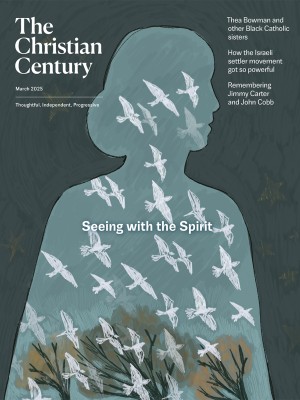March 2, Transfiguration (Exodus 34:29-35; 2 Corinthians 3:12-4:2; Luke 9:28-36, (37-43a))
Peter, James, and John are all of us.
Entering the hospital room as a student chaplain, I saw a visitor standing to one side. A middle-aged man in a felt cap and corduroy jacket, he was the pastor of the man in the hospital bed. After a few pleasantries, the pastor turned to me and said, “I was just wondering whether Jesus had any female apostles.”
I did not debate him. Instead, I addressed the man who was hospitalized, offered to return if he needed a chaplain, and excused myself. It was the first time anyone had challenged me directly like that, taking issue with my particular ministry and not just with the concept of women pastors.
Read our latest issue or browse back issues.
His voice stayed with me, likely because it echoed other voices with a greater authority in my life, people I respected and loved who thought, for no other reason than my gender, that I could not legitimately be a pastor. But beyond all those voices is the voice of God in scripture—which I’ve sought to hear to the best of my ability, with the Spirit’s help—and what I’ve understood as the voice of God in moments of encounter. For that reason, I have persisted despite my lack of certitude. As Paul writes in this week’s second reading, “therefore, since it is by God’s mercy that we are engaged in this ministry, we do not lose heart.”
Yet reading the Transfiguration story in the Gospel of Luke brings that pastor’s challenge back to my mind. “Even as this Gospel highlights women as included among the followers of Jesus, subjects of his teaching and objects of his healing,” writes Jane Schaberg in her essay on Luke in the Women’s Bible Commentary, “it deftly portrays them as models of subordinate service, excluded from the power center of the movement and from significant responsibilities.” In the previous chapter, Luke lists female followers of Jesus who travel with him and share possessions (8:1–3). So when this pivotal moment in Jesus’ life and ministry arrives and he’s accompanied only by male disciples, it feels like exclusion. What could be closer to “the power center of the movement” than the Transfiguration?
It’s true that Mark and Matthew also include the Transfiguration story, with the same three disciples in attendance. But in the context of Luke it feels more pointed, like that pastor’s question felt years ago.
And yet to focus on the gender of the disciples is ultimately to miss the point. Peter, James, and John are all of us. And Jesus transcends any gospel writer’s ability to depict him; he transcends all that any of us bring to the text as readers. The gospel is greater than the Gospels.
Our attempts to preach that good news can only give glimpses of God’s glory—as through the vapor of a cloud or a veil over Moses’ shining face. Even in a moment of intense connection with the Divine, we still know only in part. We cannot grasp God’s greatness fully any more than Jesus, Moses, and Elijah can be contained in the dwellings that Peter wants to build. Our moments of deeper understanding are as brief as illumination from forks of lightning in a storm, surrounded by a cumulonimbus shroud.
To the extent that we can comprehend anything about the Transfiguration, we should pay attention to the way this lectionary reading starts, with “these sayings” Jesus shared with all of the disciples eight days earlier. In each of the synoptic gospels Jesus explains to the disciples that he must undergo great suffering. Donald Kraybill writes in The Upside-Down Kingdom, a classic in my Anabaptist tradition, that the divine presence and confirmation of the words spoken at Jesus’ baptism reaffirm the path of suffering love for Jesus as Messiah. The Transfiguration is a foreshadowing of how Jesus will restore God’s kingdom not through violent overthrow of the oppressors but through transformative nonviolent love. Wearing the white robes of a martyr who has persevered through persecution—as in the books of Daniel and Revelation—Jesus allows Peter, James, and John to see his resurrected body. This is the glory that only God gives, the glory that the kingdoms of this earth cannot give.
The disciples do not yet understand—maybe none of us can ever truly understand—the risks when we choose the way of Jesus. Especially now, when there is much strife within the body of Christ, when those we may consider our antagonists are reading the same scriptures and singing the same hymns. We may lack certainty that ours is the one right way. Yet we can continue to seek the God we have encountered, through a veil, through a cloud. And sometimes we’ll see glimpses of glory.






